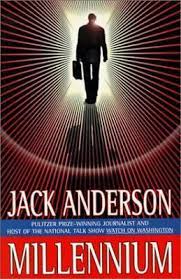Articles/Essays – Volume 28, No. 4
Mormons and UFOs | Jack Anderson, Millennium
Towards the end of Jack Anderson’s first novel, Millennium, syndicated columnist Mick Aaronson announces: “What I am about to tell you is the most important message I have ever written in all my years of Washington combat…”
After four decades of investigative journalism, Anderson seems to be saying the same thing about a novel which he says is based on intimate knowledge of the U.S. government’s best-kept secret: its awareness of extraterrestrials and unidentified flying objects.
That such a prominent figure in the world of journalism should stoop to such a subject will undoubtedly be wilder respectable people. That Ander son is LDS may disturb those who feel he is speculating about matters on which the prophets have had little specific to say. And the Mormon intelligentsia will probably be embarrassed.
This is, however, another example (the environment, animal rights, and nutrition are others that come to mind) of how the secular world has to lead us back to our own theology. No one who has taken a serious look into the strange world of UFO phenomena can underestimate its implications for religion. Zecharia Sitchin’s The Twelfth Planet makes a case for extraterrestrial manipulation of Sumerian religion. In Miracles, Scott Rogo points out that the major visions of the Blessed Virgin Mary included reports of a large silver disk next to her figure. William Bramley’s The Gods of Eden draws parallels between reports of encounters with ETs and Joseph Smith’s visions.
It would make sense that a Latter-day Saint, versed in a theology about numerous worlds populated by the offspring of the gods, would feel comfortable building a novel around visitors from outer space. There are, however, pitfalls in the process. Anderson’s story begins, as the title implies, at the end of this decade, with millennialist fever rising. An alien scientist who specializes in homo sapiens defies a cosmic ban on interacting with our corrupted race and decides to give us a warning that our evil ways will lead to the planet’s destruction, our sins bringing on environ mental disaster. As soon as he arrives in Washington, D.C., he gets mugged and a device he carries to bend others to his will is stolen by a punk, who uses it in a crime spree.
The alien ends up living with an alcoholic socialite, out of sight of a secret government agency designated to track UFO reports (it was a review of Pulitzer Prize winner Howard Blum’s investigation of such an agency, Out There, which introduced me to the man who claims to have told Jack Anderson about it in 1957, and Timothy Good’s Above Top Secret provides declassified documents in support). Others trying to find the Visitor end up being whisked away to a secret location by this agency.
Anderson knows his subject and provides readers with a thumbnail sketch of the government’s effort to understand UFOs while denying their existence to the public. None of what Anderson relates will convince the uninformed that this is more than “swamp gas,” the classic dismissal of alleged UFO sightings by the government’s real-life leading propagandist, astrophysicist J. Allen Hyneck, who later jumped ship and founded the Center for UFO Studies.
The strength of the case for an otherworldly origin now lies less with disk-in-the-sky reports than it does for the bizarre abduction phenomena alluded to by Anderson. I find it difficult to read Missing Time by Budd Hopkins and Secret Life by David Ja cobs and not come away with the impression that something is manipulating individual human agency and mass consciousness. But how to interpret this has divided ufologists into two camps: Jacobs’s contributors see this as essentially angelic intervention to save us from ourselves, Anderson’s position.
Hopkins has a more malevolent interpretation, which harmonizes with the views of ufology’s most innovative thinkers, such as Jacques Vallee, who believe UFOs are supernatural manifestations, rather than nuts-and bolts craft from another planet. And the only other significant LDS book in the field, James Thompson’s Aliens and UFOs: Messengers or Deceivers, provides a chilling theory which accounts better than any other for the many unusual facets of the UFO and abduction scenarios, such as genetic experiments and cattle mutilation. Mormons are prone to ignore these negative aspects.
One treads on dangerous theological ground to suggest that natural disasters are increasing as we approach the millennial threshold as the result of increased sin.
In my experience, otherwise intelligent people foam at the mouth when asked to read anything on the subject. They seem subconsciously threatened by the proposal or somehow manipulated into uncharacteristic close-mindedness. But I understand: until a few years ago I thought this stuff was at best amusingly irrelevant, like the Loch Ness monster. In truth, the matter of visitors from elsewhere goes to the heart of why we are here and what our destiny may be.
Millennium. By Jack Anderson (New York: Thomas Doherty Associates, 1995).


 Back to full Issue
Back to full Issue

